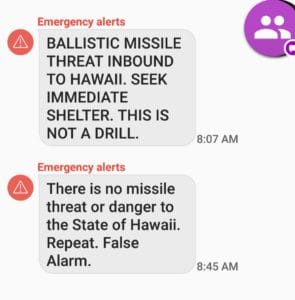Even though news bombards us 24 hours a day, we often miss hearing about events that lead the news in other regions, or in sectors we don’t normally follow. We asked several PR agencies, members of Public Relations Boutiques International, to discuss crisis management examples they followed during 2018. Dear readers, if you live outside the U.S., were you aware of the nuclear missile alert in Hawaii that caused widespread panic? If you don’t live in Germany, had you heard about the Der Spiegel journalism scandal described below? Perhaps you heard about the abuse of young Olympic gymnasts by a Michigan State University faculty member and his arrest and conviction, but you might not be aware of continuing aspects of that crisis that rolled into 2018 (and 2019).
USA Gymnastics Handling of Its Role in Dr. Larry Nassar’s Abuse of Young Gymnasts
Amy Rotenberg, Rotenberg Associates in Minneapolis and Washington, D.C., identifies one of the most high-profile crisis management examples of 2018 as the sexual abuse allegations against USA Gymnastics by the gymnast victims of Dr. Larry Nassar, the convicted Michigan State University faculty member, and the related state, congressional and independent investigations.
Rotenberg notes that USA Gymnastics is still under legal, regulatory and media scrutiny to determine what the organization and leadership knew, when they knew it, and what they did when they learned of the team doctor’s sexual abuse of hundreds of elite gymnasts. Many allege the governing sports body either knew of the abuse and tried to cover it up, or should have known and done more to protect its young athletes.
“USA Gymnastics has made strong efforts to demonstrate accountability and manage the fallout by asserting its cooperation with investigations, firing its president, issuing supportive and compassionate statements to victims, and beginning the implementation of new policies and procedures for preventing and reporting sexual abuse in the sport,” Rotenberg asserts. “But these efforts have not effectively changed the tide of public opinion as USA Gymnastics continues to struggle to defend itself amidst fierce litigation, bankruptcy and the growing number and broadening scope of investigations.”
What’s gone wrong with the crisis management? Rotenberg gives her analysis: “To regain the trust of its stakeholders and the public in the face of the horrific revelations about Larry Nassar, USA Gymnastics should lead with its values, put the safety of its young athletes first, and demonstrate accountability by doing the right thing and with awareness of how each action will appear and be interpreted by skeptical observers,” she says.
“Yes, seek to replace board members and senior executives with new and accountable leaders, but don’t promote from within individuals directly involved in the controversy, or hire from outside those from organizations accused of contributing to the cover up. USA Gymnastics stumbled repeatedly in just those ways in its effort to replace its disgraced president.”
Rotenberg concludes, “While often saying the right things, and probably even intending to do the right things, USA Gymnastics time and again has undermined its efforts by doing the wrong things. As it continues to navigate a complex and ongoing crisis, USA Gymnastics must always take care to align its actions with its words and pay attention to how all of its actions will be viewed.”
Der Spiegel “Fake News” Scandalizes German Readers
Just before Christmas, management of Der Spiegel, Germany´s most highly-regarded news weekly, synonymous with accurate investigative journalism, held an internal meeting to inform the staff about some “worrying incidents.” Judith Huss, Huss PR Consult in Munich, says this meeting was leaked to a German trade publication which exposed the nature of these incidents. An award-winning author and highly acclaimed reporter had faked large parts of over 50 articles he wrote that were published in Der Spiegel. The story that revealed this was a report about militia at the U.S.-Mexican border. It came out later that he had fabricated stories also for other well-respected German publications.
“The public learned about this directly from Der Spiegel itself,” says Huss. “They reported on it in a very open, detailed and humble manner. There was a letter by the editor to the readers, a letter to the staff and a dedicated microsite where all information about the situation was collected and is constantly being updated.”
Huss adds that there was also self-criticism of a climate at the publishing house which led the author to excel with stories and details that were “just too brilliant to be true.” There was also an admission by editorial management that the editorial fact-checking system had failed miserably to reveal this writer’s fabrications. The scandal was heavily discussed on social media and reported in other media. Der Spiegel appointed a dedicated committee of senior journalists to continue exploring the situation. There are regular reports on the website detailing progress and updates on the findings.
“In my opinion, Der Spiegel is handling this crisis well by not trying to make it disappear too fast,” concludes Huss. “In a country where right-wing campaigners wander the streets shouting “Lügenpresse” [lying press] to undermine the media’s credibility, it is of utmost importance to fully clarify the situation and take serious measures to prevent such happenings in the future.”
False Nuclear Alert Caused Widespread Panic
Dan Leinweber, Leinweber Associates in Boston, relates the story of one crisis that personally affected him and his wife. “In January 2018 my wife, Bobbie, and I were vacationing in Hawaii. We had just begun a hike when both of our cell phones gave a blaring sound and our screens said: “BALLISTIC MISSILE THREAT INBOUND TO HAWAII. SEEK IMMEDIATE SHELTER. THIS IS NOT A DRILL.”
There was no shelter nearby, Leinweber says. “What were we to do? We continued to walk. We figured if our time was up, Hawaii wasn’t the worst place for it to end. It took a full 38 minutes for a correction to be sent to all cell phones in Hawaii. The FCC public safety bureau attributed the false alert to a combination of human error and inadequate safeguards: there was no procedure in place to prevent a single person from mistakenly sending a missile alert to the state of Hawaii, nor was there a procedure for recalling a false alert.”
Sydney, Australia-based risk management consulting company Risk Frontiers conducted research on how people reacted to the false alarm. The company analyzed interviews that had appeared in the media with 207 people to determine their attitudes and behaviors upon seeing the alert. The research results were reported in Asia Pacific Fire, a journal for fire service and emergency management professionals. Many of the interview respondents trusted the alert because of the publicity given to increased tensions between the U.S. and North Korea. According to the journal article, while some people checked online, and on broadcast news, social media and other methods, Risk Frontiers concluded from people’s interviews that a large number of people may not have tried to confirm the legitimacy of the warning. Most of those interviewed did try to seek shelter in a building, such as in their own homes or the hotels they were staying at, but not all did this, and some said they didn’t know what to do and did nothing. Risk Frontiers concluded that “even in extreme circumstances, emergency warnings cannot be relied on to achieve full compliance by communities.”
Since the debacle, Leinweber reports, the state emergency agency has implemented new safeguards. Two credentialed warning officers must now validate every alert and test. Supervisors must receive advance notice of all drills. A template has been created for correcting false alerts. So, it’s fair to say that the State of Hawaii—and other governmental organizations, hopefully—learned something from this crisis situation.

